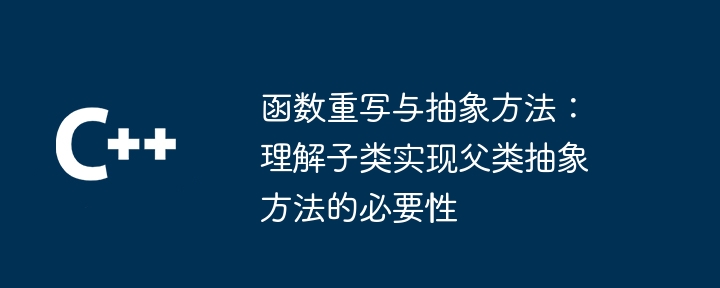Home >Backend Development >C++ >Function rewriting and abstract methods: Understand the necessity of subclasses to implement abstract methods of parent classes
Function rewriting and abstract methods: Understand the necessity of subclasses to implement abstract methods of parent classes
- WBOYWBOYWBOYWBOYWBOYWBOYWBOYWBOYWBOYWBOYWBOYWBOYWBOriginal
- 2024-05-03 09:30:02973browse
Function overriding allows subclasses to redefine parent class methods, while abstract methods force subclasses to implement unimplemented methods of the parent class. It is crucial for subclasses to implement abstract methods of the parent class because it: improves code flexibility and extensibility; reduces code redundancy and promotes reuse; and enhances testability, allowing easy verification that the subclass correctly implements the parent class interface.

Function rewriting and abstract methods: Understand the necessity of subclasses to implement abstract methods of parent classes
Introduction
In object-oriented programming, function overriding and abstract methods are two key concepts that allow us to create flexible and extensible class hierarchies. In this article, we will explore these two concepts and understand their differences through practical examples.
Function rewriting
Function rewriting refers to redefining methods that already exist in the parent class in the subclass. This allows subclasses to customize the parent class's methods while still retaining its core functionality. The syntax is as follows:
class Parent:
def foo(self):
print("Parent foo")
class Child(Parent):
def foo(self):
print("Child foo")In the above example, the Child class overrides the foo method and prints a different message.
Abstract method
An abstract method is a method that does not provide an implementation. It forces subclasses to implement the method before instantiation. The syntax is as follows:
from abc import ABC, abstractmethod
class Parent(ABC):
@abstractmethod
def foo(self):
pass
class Child(Parent):
def foo(self):
print("Child foo")In this example, the Parent class contains an abstract method foo. To instantiate the Child class, we must provide an implementation of the foo method. If we don't do this, a NotImplementedError exception will occur.
The necessity for subclasses to implement abstract methods of parent classes
It is crucial for subclasses to implement abstract methods of parent classes because it allows parent classes to define abstract interfaces, and children Classes provide concrete implementations. This helps in the following areas:
- Flexibility and extensibility: Abstract methods allow the creation of a common API that can be implemented by different subclasses, thus Improve code scalability and flexibility.
- Code reuse: Abstract methods prevent subclasses from duplicating the public functions of the parent class, thereby reducing code redundancy and promoting reuse.
- Testability: Abstract methods allow us to easily test whether the subclass correctly implements the interface of the parent class.
Practical case
Suppose we are developing a graphics library. We can create an abstract Shape class that defines the basic geometric properties and drawing methods of the shape:
from abc import ABC, abstractmethod
class Shape(ABC):
def __init__(self, color, x, y):
self.color = color
self.x = x
self.y = y
@abstractmethod
def draw(self):
pass We can then create subclasses Square andCircle, respectively implement drawing squares and circles:
class Square(Shape):
def __init__(self, color, x, y, side_length):
super().__init__(color, x, y)
self.side_length = side_length
def draw(self):
print(f"Drawing a square with color {self.color}, x {self.x}, y {self.y}, and side length {self.side_length}")
class Circle(Shape):
def __init__(self, color, x, y, radius):
super().__init__(color, x, y)
self.radius = radius
def draw(self):
print(f"Drawing a circle with color {self.color}, x {self.x}, y {self.y}, and radius {self.radius}")By using the abstract method draw, we can ensure that all shapes can be drawn, while allowing subclasses to provide their own specific implementation.
The above is the detailed content of Function rewriting and abstract methods: Understand the necessity of subclasses to implement abstract methods of parent classes. For more information, please follow other related articles on the PHP Chinese website!

